117 Days
The University of Richmond, like higher education institutions across the country, began the fall semester with an adjusted schedule, an ambitious strategy, and an uncertain trajectory. The plan was to get students, faculty, and staff through 117 days of a residential fall semester with low infection rates, high spirits, and as much normalcy as possible under the circumstances.
It worked. When, as planned, students moved off campus just before Thanksgiving to complete the final two weeks of the semester remotely, they completed a story of resilience in the face of adversity.
It was also a story of careful planning and shared responsibility. The substantial efforts and investments the university made in a variety of areas — deep cleaning, reconfigured learning spaces, prevalence testing, and overwhelming adherence to face covering and physical distancing policies — resulted in no known community transmission, which happens when you can’t identify a source of exposure.
Rather, when the campus Rapid Response Team and health center staff, in coordination with the Virginia Department of Health, looked into the reasons for positive test results and completed contact tracing, they inevitably found links to breaches of guidelines, such as off-campus social gatherings. The effectiveness of the safety protocols was, understandably, a point of immense pride for the many faculty and staff members who developed and implemented these safeguards over many months and reexamined them for the spring semester.
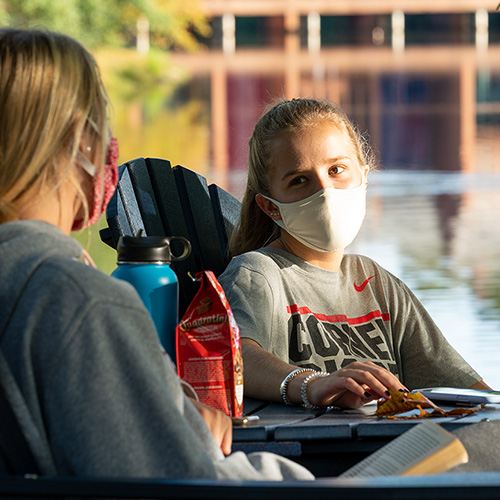 No one thought the campus community wouldn’t see any positive test results. Indeed, it did. Still, the monthly positivity rate stayed exceptionally low, averaging just 1.2% of test-takers over the semester, much lower than national rates and what the administration had prepared contingency plans for.
No one thought the campus community wouldn’t see any positive test results. Indeed, it did. Still, the monthly positivity rate stayed exceptionally low, averaging just 1.2% of test-takers over the semester, much lower than national rates and what the administration had prepared contingency plans for.
Overall, the prevention strategies held, which allowed the semester to proceed. Despite the constraints, students did what students do. They went to classes and labs, studied in the library, performed Shakespeare, ate D-hall food, and saw their friends, even if it all had to be done a little differently for now.
“The students deserve so much credit,” said Steve Bisese, vice president for student development. “This experience is not what they thought college was going to be like.”
Perhaps Kelly Lambert — a behavioral neuroscientist who taught portions of her psychology seminar in a tent in the Queally Center’s courtyard — summed up life on campus this fall as well as anyone when she said, “I guess this semester is a perfect time to teach a course on adaptive behavior.”
The pages that follow offer a glimpse of what it looked like.
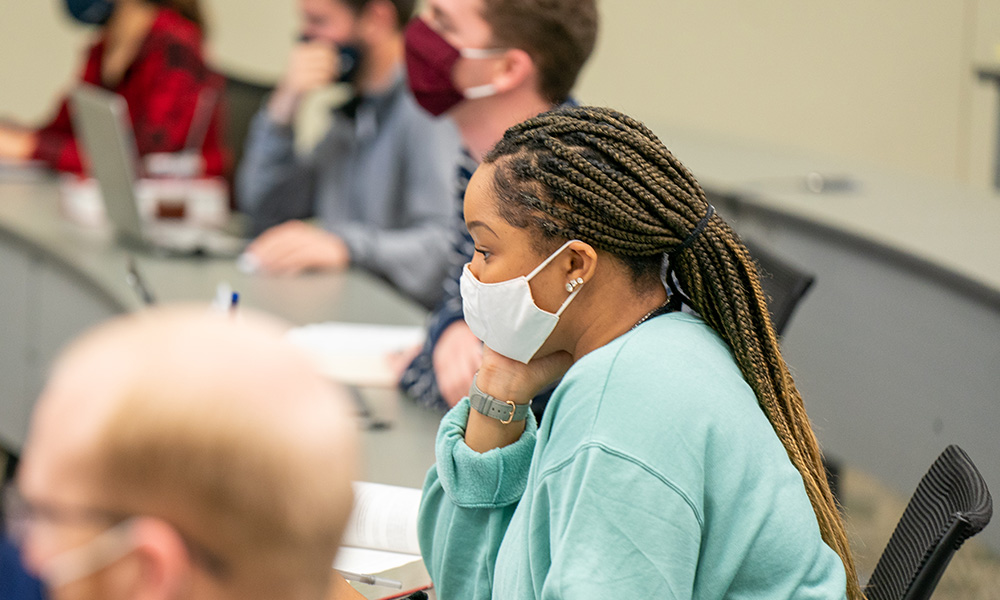
[On the first day of classes,] my usual 10-minute walk across campus took 20 or 30 minutes. I was blinded a bit by hubris and the ability to talk to someone without a computer glitch. I did not want to pass up the opportunity to catch up on friends' lives and to tell them how much I missed them. After all, an outbreak could occur tomorrow, for all I know.

A sound solution
Innovative thinking, industrial-grade sewing, and a little elbow grease came together to improve acoustics in a temporary classroom early in the semester.
The tall ceiling inside Jepson Alumni Center’s large meeting room created an echo that made it a tough spot for in-person and remote law school students to hear each other.
 “It’s a big, voluminous room,” said Andrew McBride, associate vice president for facilities and university architect.
“It’s a big, voluminous room,” said Andrew McBride, associate vice president for facilities and university architect.
McBride and his team brainstormed solutions and created a sketch of cloth banners that would cut down the noise. McBride, who sails, used an industrial sewing machine he has for his hobby to stitch a prototype. It worked, so they took the next obvious step.
“We went out to a fabric store and bought out the store of all its fleece,” McBride said. In about a day, Vessela Stefanova, an administrative assistant in university facilities created 20 additional banners for the space. Electrical shop staff installed them over the Labor Day weekend, and telecom/media support added dozens of microphones.
“I think that it’s just a can-do attitude,” McBride said. “We’re here to help facilitate the educational mission of the university, and we want to help meet those needs.”
I asked each student what they liked about the pandemic -- yes, liked -- and their answers were great. Most cited the time they got to spend with their families and their pets. They also noted that they were enjoying the outdoors more. Two of my classes are in the Halftime House at the football stadium. We all agree that it's a really fun venue. There may not be football this fall, but there is an accounting class in a football stadium.

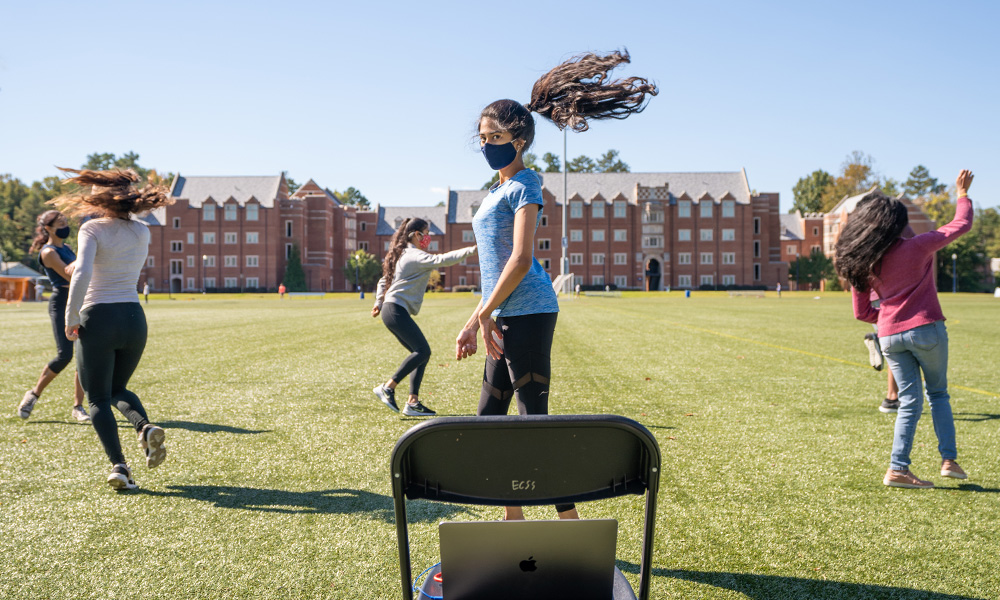
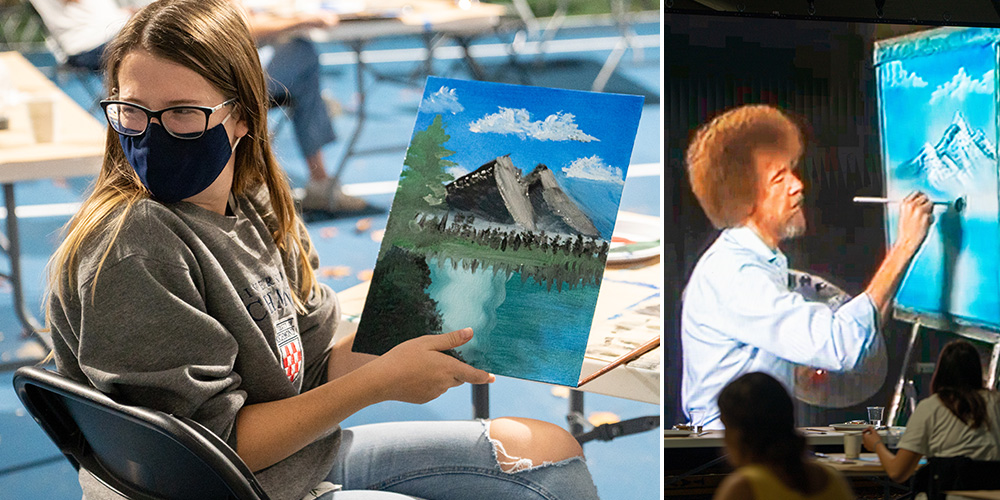
[Students] were glad to be back on campus and happy to see their friends and professors, but at the same time they were nervous, confused, and uncertain about the future. We talked about how these emotions were normal and good to have and that research has shown that it is very possible to experience contradictory emotions simultaneously.

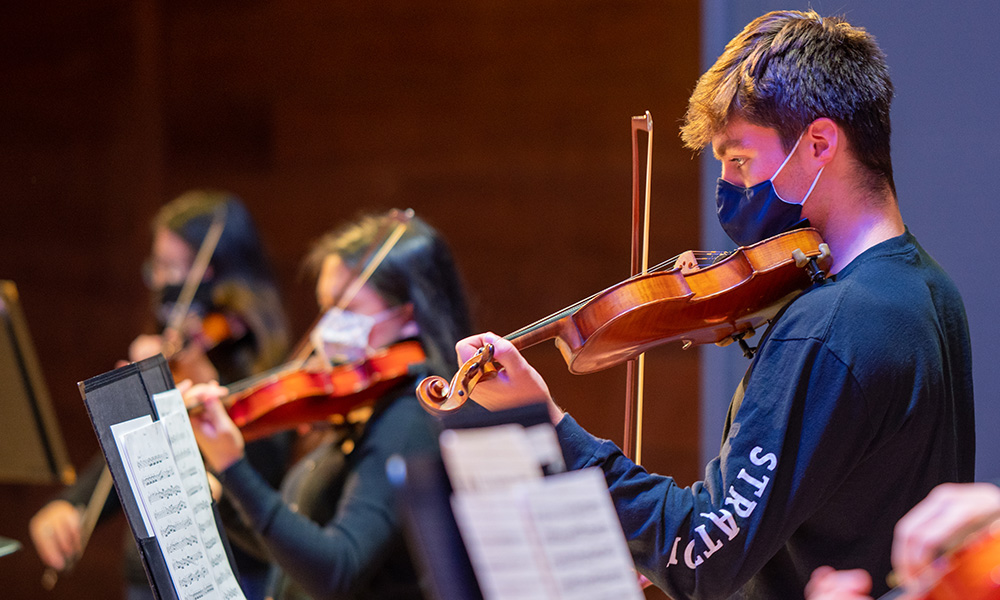
Finding gratitude in turbulent times: A conversation with university chaplain Craig Kocher
How can we cultivate gratitude into our everyday lives — even in stressful times?
Gratitude helps us see the abundance of life at a time when everything feels absent. When so much of what makes life normal is scarce — daily contact with others, travel, family gatherings and celebrations, simple routines — a posture of gratitude can serve to reframe and focus our attention on the abundance of what we have rather than on what is missing. We are likely to discover we have all we really need and more.
How has a year like 2020 affected our ability to show gratitude?
I think particularly in the midst of incredible anxiety — from COVID-19 to the tumult of the election, to economic fragility and social injustice — practicing gratitude has the possibility to serve two purposes: It deepens our empathy and compassion for others. The more we are aware of how much heartache there is in the world, the more our hearts break for others and we are moved to action. At the same time, we become more aware of the blessings that we enjoy in our own lives and thus become less anxious and more settled. Those are not mutually exclusive; they are mutually reinforcing. What can we be grateful for during times of crisis?
What can we be grateful for during times of crisis?
Oftentimes, they are really simple things. To be mindful of the gift of having a warm place to be on a cold, rainy day when you’re working from home. The gift of being around family 24/7 even when you want to strangle them. The gift of feeling connected via technology even when we’re all exhausted by Zoom fatigue. The gift of being a part of a community like UR where everybody is working so hard to accomplish a vital mission. The gift of health when we’re so profoundly aware of those who are not in good health. Such a posture of thanks lends itself to a deeper awareness of how others are struggling and to wonder, “How can my own gratitude become a source of compassion and encouragement for someone else?”
In a year that has seemed so negative, how can gratefulness lead to something positive?
Maybe one of the gifts that can come out of this time of incredible negativity is a re-centering on that which really matters. Perhaps we’ll learn not to sweat the small stuff so much. I’m hopeful that when the new horizon dawns and some of this anxiety begins to dissipate, we’ll come out of it with a deeper collective sense of the things that really matter and try to shape our individual lives and communities toward those ends.
